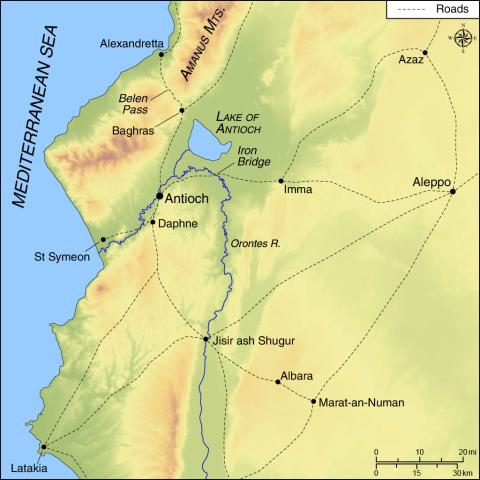Kerbogah Tries to Retake Antioch
[9.22.2] Tum Curbaram, māterna audiēns monita, ferōcī respondit sermōne: “Quid est hoc, māter, quod mihi refers? Putō quod insānīs, aut furiīs es plēna. Enimvērō mēcum habeō plūrēs ammiraliōs, quam Chrīstiānī sint, sīve māiōrēs sīve minōrēs.” Respondit eī māter sua: “Ō dulcissime fīlī, Chrīstiānī nequeunt vōbīscum bellāre: sciō namque quod nōn valent vōbīs pugnam īnferre; sed deus eōrum prō ipsīs cotīdiē pugnat, eōsque diē noctūque suā prōtēctiōne dēfendit, et vigilat super eōs sīcut pāstor vigilat super gregem suam; et nōn permittit eōs laedī nec conturbārī ab ūllā gente, et quīcumque volunt eīs obsistere, īdem eōrum deus conturbat illōs, sīcut ait ipse per ōs Dāvīd prophētae: ‘Dissipā gentēs quae bella volunt.’ Et alibī: ‘Effunde īram tuam in gentēs quae tē nōn nōvērunt, et in rēgna quae nōmen tuum nōn invocāvērunt.’
notes
(June 1098) Kerbogah thinks his mother is crazy, since his army is huge. She replies that he should fear not the crusaders but their god.
quam Chrīstiāni sint: “than there are Christians”; CL would be quam Chrīstiānī sunt.
sīve māiōrēs sīve minōrēs: i.e., "no matter how big they are"; perhaps an intentionally odd way of putting it.
Dāvīd prophētae: gen. sing.
‘Dissipā gentēs quae bella volunt’: Psalm 67:31.
‘Effunde īram tuam in gentēs,’ etc.: Psalm 79:6.
vocabulary
insāniō insānīre insānuī (insāniī) insānitum: to be out of one’s mind
noctū: at night, by night

